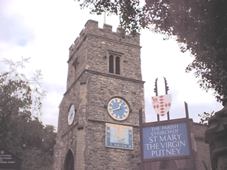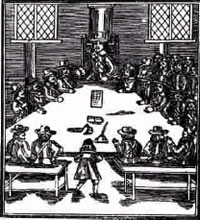Putney Debates
What were the Putney Debates?
 The Putney Debates were discussions about a new constitution for England held at the Church of St Mary the Virgin, Putney, in October and November 1647 between factions of the New Model Army and some citizens.
The Putney Debates were discussions about a new constitution for England held at the Church of St Mary the Virgin, Putney, in October and November 1647 between factions of the New Model Army and some citizens.
The Debate centred around An Agreement of the People, a written constitutional proposal drafted by John Wildman (1623-1693), and endorsed by 'Agitators' - representatives of each regiment elected to confer with senior officers and Parliament over Army grievances.In the absence of Sir Thomas Fairfax, the discussions were chaired by Oliver Cromwell, who naturally favoured the senior Army officers or 'Grandees' - at that stage still seeking a negotiated settlement with the King.
 The Grandees' case was argued most forcibly by Henry Ireton who insisted that his own Heads of Proposals covered all the issues raised in the Levellers' Agreement with far less radical disruption of society.
The Grandees' case was argued most forcibly by Henry Ireton who insisted that his own Heads of Proposals covered all the issues raised in the Levellers' Agreement with far less radical disruption of society.
Colonel Thomas Rainsborough (MP for Droitwich) the highest-ranking Leveller sympathiser in the Army. Other Leveller spokesmen were the Agitators Edward Sexby and William Allen, and civilians John Wildman and Maximilian Petty.Much of the debate centred around the franchise.
In reply to Ireton's criticism of universal manhood suffrage, Rainsborough stated the Leveller position succinctly:
"For really I think that the poorest he that is in England hath a life to live, as the greatest he; and therefore truly, Sir, I think it's clear, that every man that is to live under a government ought first by his own consent to put himself under that government; and I do think that the poorest man in England is not bound in a strict sense to that government that he hath not had a voice to put himself under."
A compromise was eventually reached over the franchise - the vote would be granted to all men except alms-takers and servants. Agitators also secured a vote for a mass rendezvous at which the Agreement would be presented to the Army. This was modified to three smaller reviews - resulting a near-mutiny. However, the escape of King Charles from Hampton Court on 11 November 1647 dramatically changed the situation. The Putney Debates were abruptly curtailed with little concrete outcome.